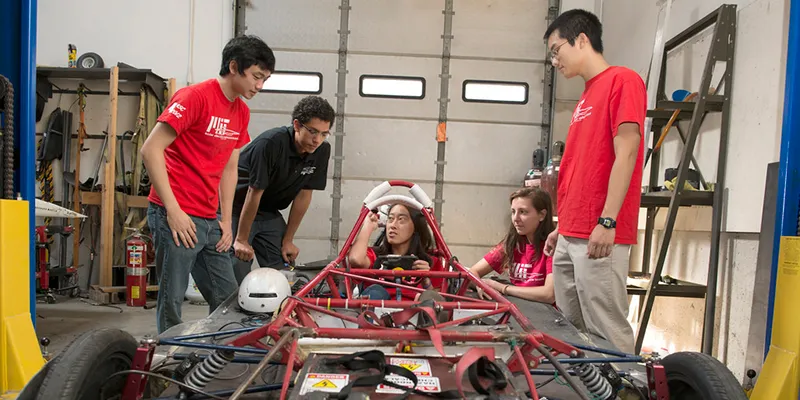
EMERITUS INSTITUTE OF MANAGEMENT
View Brand PublisherApple and Google count on design thinking for innovation. Here’s why you should too
What gives any product or service that ‘wow’ factor and sets it apart from others?
The answer, as companies like Apple and Google and even some startups have discovered, lies in an approach called ‘Design Thinking’, which is what drives their competitive edge.
This is a relatively new practice in the business world, and there are different definitions of what exactly constitutes ‘Design Thinking’. While some call it a ‘problem-solving protocol that helps you achieve big results by focusing on the solution’, others say it is a ‘core strategy that creates an organisational culture focused on solving problems for the end user.’ There are also those who talk about design thinking as a factor that can impact the greater good and change life for the better.

Whatever the definition, the fact is Design Thinking is enabling organisations of all sizes to ideate better, develop new approaches to innovation, weave insights and concepts together, and ultimately helping them meet their customers’ needs more effectively.
Why Design Thinking is critical for today’s professionals
Today it is being applied to improve products, services and processes and is becoming a part of the day-to-day operations in companies, and is also being taught as an independent discipline.
“If we as professionals are serious about growing our career, then we need to continually educate ourselves,” says Mark Jamieson, Founder, The Calm Revolution, who took an online course on ‘Innovation of Products and Services: MIT’S Approach to Design Thinking’ offered by Massachusetts Institute of Technology (MIT) in collaboration with The EMERITUS Institute of Management.
This MIT course blends the perspectives of marketing, design and engineering into a systematic approach to deliver innovation, and enables professionals and students to learn how to take a similar approach in their own businesses.
So far, since the launch of the course in May 2016, 115 professionals from 12 countries and diverse industries ranging from marketing to manufacturing and consulting to software development, have opted for this course. Notably, the course has seen a whopping 89% completion rate, contrary to popular observations that online courses see dwindling participation after the first few classes.
More than 200 + ideas have been generated and students cumulatively received 4,996 suggestions from their peers. The ideas range from child education in remote areas, precision agriculture, applying virtual reality to work outs, compost indicating garbage bags, shower water recycling and many more.
It’s not just a course, it changes your approach to everything
When these participants are asked what has been the tangible outcome of the course, there are some interesting responses, like that of Laetitia Hoquetis, a Sales and Account Manager at Bloomberg. She says, “What I learnt applies to almost every situation, product, service, whether it is innovation or not. It helps us ask the right questions and then take the next steps.” Another participant, Tanut Karnwai, a Team Lead at the Beumer Group,says, “I got to understand how innovation works and how I can capitalise on it.”
So how is this online course different from many others in the market? Is this course really relevant? These are probably some of the questions that the sceptic in us would ask.
Why learn Design Thinking from MIT?
The ‘Innovation of Products and Services: MIT’S Approach to Design Thinking’ course teaches participants to understand the design thinking process; identify and assess customer opportunities; generate and evaluate new product and service concepts; design services and customer experiences; design for environmental sustainability; and evaluate product development economics. A team-based concept development project assignment, focused on opportunity evaluation and concept development, is integrated into all course modules. The course consists of discussions, case studies, a capstone project, real world applications and 62 interactive lectures.
These features are not just promises in well-designed marketing brochures or the website, but are part of the actual experience. According to Mark, the key highlights were the “course content, delivery, and quality participants.” He says, “The content, both from MIT Professor Steve Eppinger and approaches from IDEO were leading edge. Added to that, the course structure had a good mix of online learning, weekly group webinars and group assignments. Then again, the group itself was highly motivated and provided quality inputs. All this put together has helped me enhance my own offering.”

Sharing his perspective on the course, Tanut says, “I have always believed that the best way to learn is to learn with a group of people, because it helps to share and leverage each other’s ideas. Through interactions with instructors and course participants, this online design thinking course truly helped me understand real problems, brainstorm and ideate, and overcome traditional boundaries. The modules and assignments helped me to see things differently.”
Venugopal Murthi, Manager – User Experience, at Xoom Corporation, a PayPal Service, says he is glad that he decided to join the course, in spite of his busy work schedule. “I’ve had a great learning curve due to the course. Bob Halperin, the Academic Director, has done a great job in guiding me through the course and providing valuable feedback on assignments. The programme coordinator too was amazingly quick in responding to the queries that the team had.”
Design Thinking is just one of the many industry-relevant courses offered by IVY League business schools through the EMERITUS platform. In addition to core subjects like finance, marketing, and leadership, EMERITUS also offers cutting edge courses on topics such as digital marketing, social media analytics, digital business strategies, digital marketplaces, negotiation and innovation, among others. In spite of being a new entrant in the online education space, the institute’s collaboration with IVY League schools and a heavyweight faculty stand it in good stead.
An IVY League education
The Institute offers management education programmes in collaboration with three top-ranked business schools: MIT Sloan, Columbia Business School and Tuck at Dartmouth. This collaboration opens door for professionals to pursue a world-class business education while continuing their professional careers.
The faculty at EMERITUS comprises professors who have been recognised for their contribution to thought leadership in management. They include Steve Eppinger (Design Thinking), Jared Curhan (Negotiation and Influence) and John Van Maanen (Leading Organisations) from MIT Sloan, Kathy Phillips & Adam Galinsky (Leading People & Teams) from Columbia Business School and Vijay Govindarajan (Leading Innovation Using the 3 Box Solution) and Marshall Goldsmith from Tuck School of Business at Dartmouth.
As new business concepts and trends emerge, it becomes imperative for professionals to stay up to date. For the moment, design thinking is one such discipline where the buzz is. Companies like Virgin, Toyota, and scores of others have been vocal about how they are able to innovate continuously due to the culture of design thinking. There’s no reason why you cannot join them.







